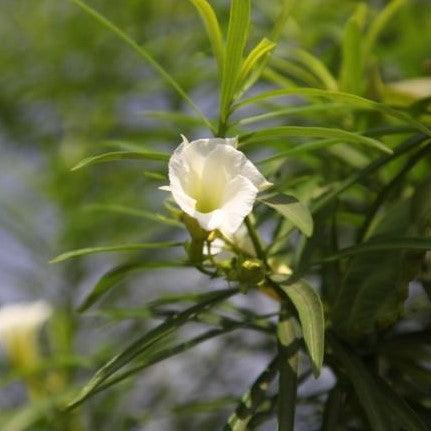

Description
- Common name:
- Lucky Nut White, Bitti White, Trumpet Flower, Be Still Tree,
- Regional name:
- Marathi - Bitti, Pilvalakanhera, Hindi - Pil-kaner, Bengali - Kolka-phul, Tamil - Pachaiyalari, Telgu - Pachchaganeru, Gujarati - Pila-kanera, Kannada - Kadukasi, Malayalam - Manja Areli, Sanskrit - Berenjo
- Category:
- Trees, Shrubs, Medicinal Plants
- Family:
- Apocynaceae or Plumeria or Oleander family
- Light:
- Sun growing, Semi shade
- Water:
- Normal
- Primarily grown for:
- Flowers
- Flowering season:
- Year-around flowering
- Flower or Inflorescence color:
- White
- Foliage color:
- Green
- Plant Height or length:
- 6 to 8 meters
- Plant Spread or Width:
- 4 to 6 meters
- Plant Form:
- Spreading, Upright or Erect
-
Plant Description:
-
Thevetia nerifolia, also known as yellow oleander or lucky nut, is a small tropical tree or shrub that is native to Mexico and Central America. The species name "nerifolia" means "nerium-leaved," referring to the plant's resemblance to the leaves of Nerium oleander. The common name "yellow oleander" comes from the plant's bright yellow, trumpet-shaped flowers. The plant is also known as Thevetia peruviana, and I couldn't find any information about a variety called Alba.
Thevetia nerifolia is an evergreen tree or shrub that can grow up to 10 meters tall. It has glossy, dark green leaves and produces clusters of bright yellow, trumpet-shaped flowers that are up to 5 centimeters long. The plant is toxic, the leaves, bark, seeds and flowers contain cardiac glycosides which may cause serious heart problems, nausea, vomiting, and death if ingested. It's not a plant recommended for indoor gardening or landscapes in areas where children or pets may come into contact with it.
-
Growing tips:
-
I apologize, I made a mistake in my previous response. I couldn't find any information about a variety of Thevetia nerifolia called "alba." It's possible that it doesn't exist or the name is a synonym used by some cultivators.
In general, Thevetia nerifolia is a relatively easy plant to care for and can be grown as a houseplant or outdoors in warm, tropical climates.
Here are some tips for caring for Thevetia nerifolia:
-
Light: The plant prefers bright, indirect light, but can tolerate some shade.
-
Water: Water the plant when the top inch of soil is dry. The plant is drought-tolerant, so be careful not to overwater.
-
Soil: The plant prefers well-draining soil with a pH between 6 and 7.
-
Temperature: The plant prefers warm temperatures between 60 and 80 degrees Fahrenheit. It cannot tolerate frost.
-
Fertilizer: Thevetia nerifolia can benefit from a monthly application of a balanced, water-soluble fertilizer during the growing season.
-
Pruning: Prune Thevetia nerifolia to control its shape and size. The plant can be pruned at any time, but it is best to do so after it has finished blooming.
Please keep in mind the toxicity of the plant, so it's not recommended to use it as indoor plants. If you decide to grow it, be sure to keep it out of reach of children and pets, and wash your hands thoroughly after handling the plant.
-
-
Benefits:
-
I apologize for any confusion, as I mentioned earlier, I couldn't find any information about a variety of Thevetia nerifolia called "alba." As such, I'm not aware of any specific benefits that a "Thevetia nerifolia alba" plant would have over the more commonly known Thevetia nerifolia plant.
That being said, Thevetia nerifolia, also known as yellow oleander, has been traditionally used in some parts of Central and South America as a medicinal plant. It has been used to treat a variety of conditions, including:
-
Heart conditions: The plant contains cardiac glycosides, which have been used to treat heart problems such as heart failure and high blood pressure.
-
Stomach ailments: The plant has been used to treat stomach problems such as indigestion, nausea, and vomiting.
-
Skin conditions: The plant has been used to treat skin problems such as ringworm and eczema.
It's worth noting that the plant is highly toxic, its leaves, bark, seeds and flowers contain cardiac glycosides which may cause serious heart problems, nausea, vomiting, and death if ingested, even a small amount can be fatal. Its use as a medicine is not recommended and should be done under the direction and supervision of a qualified healthcare professional.
Please keep in mind that it is not safe to use Thevetia nerifolia as a medicine without the supervision of a qualified healthcare professional and that further research is needed to determine the safety and efficacy of its medicinal use.
-
